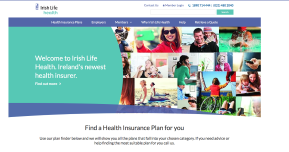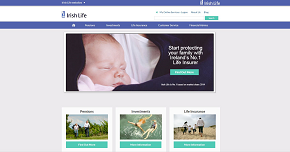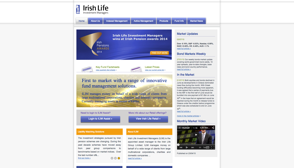What is Voluntary Risk?
Voluntary Risk products are offered to unions, representative bodies and large employers with at least 800 members or employees. The key benefits of Voluntary Risk cover are low cost of cover (significantly cheaper than on an individual basis) and ease of application (shorter application forms with fewer medical questions).
We are the market leader in the Voluntary Risk market in Ireland. We insure over 100 voluntary schemes covering 120,000 members across a wide range of companies, trade unions, professional organisations and other groups. (Source: Irish Life)
Our Voluntary Risk product range includes:
Life Assurance Cover
Life Assurance cover serves to pay out a lump sum on the member’s death. Tax relief may be available on contributions if life assurance cover is written under an Additional Voluntary Contribution (AVC) plan.
Costs
Due to the large number of people applying for this life assurance cover, costs can be significantly cheaper than if a member were to take out life cover on an individual basis. Rates are also applicable for at least two years.
Underwriting
Also, when a large number of people apply, we can adopt an innovative approach to the underwriting process. We forego the need for full application forms with medical questions, instead, members may only need to answer as little as six simple yes/no medical questions.
Specified Illness Cover (Critical Illness Cover)
Specified Illness Cover, also known as critical illness cover, pays the member of a scheme a tax-free lump sum in the unfortunate event of them suffering one of a range of illnesses specified in the policy.
|
1) Alzheimer’s disease |
10) Deafness |
20) Multiple sclerosis |
|
2) Aorta graft surgery |
11) Heart attack |
21) Paralysis of limbs |
|
3) Benign brain tumour |
12) Heart valve replacement or repair |
22) Parkinson’s disease |
|
4) Blindness |
13) Heart valve structural repair with surgery to divide the breastbone |
23) Respiratory failure of specified severity |
|
5) Cancer |
14) HIV Infection |
24) Severe burns or third degree burns |
|
6) Coma |
15) Kidney Failure |
25) Stroke |
|
7) Coronary Angioplasty |
16) Loss of Limbs |
26) Bacterial Meningitis (Children Only) |
|
8) Coronary artery by-pass graft |
17) Loss of Speech |
|
|
9) Creutzfeld-Jakob disease (CJD) |
18) Major organ transplant |
|
Payment of Benefit
If you suffer one of the above specified illnesses and wish to claim under the plan, you must survive for a minimum period after the date on which the illness was diagnosed or surgery took place, before a payment can be made. In the event of death within this period no benefit is payable. The relevant periods are:
- 14 days for heart attack, coronary artery surgery, angioplasty (two arteries), cancer, coma, emphysema, stroke, kidney failure, heart valve surgery, aorta graft surgery, major organ transplant, benign brain tumour, multiple sclerosis, motor neurone disease, severe burns, CJD, HIV infection, paralysis of two or more limbs and severance of two or more limbs.
- six months for Parkinson's Disease, Alzheimer's Disease and loss of sight.
- twelve months for loss of hearing and loss of speech.
- 14 days after surgery in cases where there has been pre-payment of part of the benefit. The balance of the benefit would be paid upon survival after this period.
Costs
The cost of applying for Specified Illness Cover on a group basis can be significantly cheaper than applying on an individual basis. Rates are reviewed every two years and remain in place until the following review.
Child Cover
Every scheme includes a level of Specified Illness Cover for each member’s children (aged 1-21). This benefit is FREE OF CHARGE. Children are covered for the same illnesses as the member, with the addition of Bacterial Meningitis.
Underwriting
When a large number of people apply for cover there are no underwriting requirements, therefore no application forms need to be completed or detailed medical questions answered. However, it should be noted that due to this large concession which is not typical, you will not be covered for any ‘pre-existing’ conditions, and there are restrictions regarding pre-existing related conditions.
Pre-existing conditions
- Where you have previously suffered, at any time prior to the commencement date of cover from one of the specified illnesses covered you will never be covered for that illness and cannot therefore claim for that illness.
- In the event of one of the specified illnesses covered occurring within two years of the commencement date of cover you will not be paid a claim for a particular illness and cover for that illness will cease, if prior to the commencement date of cover you suffered from one of a number of related conditions.
- No cancer claims will be paid where the condition presents within the first six months of you joining the plan. In such circumstances cover in respect of cancer ceases.
Income Protection
Income Protection is designed to provide an income for employees should they find themselves out of work for a prolonged period of time due to illness or injury. The plan provides a regular income benefit to be paid to an employee following a certain period of time (known as the deferred period) to replace a reduction or loss of earnings caused by their inability to carry out their normal occupation due to illness or injury. The benefit is paid monthly in arrears. The standard minimum deferred period is 26 weeks.
Income Tax relief may be available on premiums (subject to certain conditions).
You can claim Income Tax relief for premiums up to 10% of your salary. The Income Tax relief is at your marginal rate. The current income tax rates (as at May 2015) are 20% (Standard rate) and 40% (higher rate - for annual salary greater than €37,150). Income Tax relief is normally given at source, where your employer facilitates it. Otherwise, you can claim the tax relief from your local tax office through your annual tax returns.
Group Income Protection schemes sometimes have Revenue approval if premium are deducted directly from salary, and income tax relief is applied at source.
The benefit amount is treated as normal income for tax purposes, i.e. it is subject to PAYE, PRSI and Universal Social Charge.
Cost
The cost may be significantly cheaper than if an employee were to apply for similar cover on an individual basis. Rates are reviewed every two years and remain in place until the following review.
Underwriting
When a large number of people apply we forego the need for the completion of full application forms; instead employees may only need to answer as little as eight simple yes/no medical questions.
Marketing Support for Voluntary Risk groups:
- We will carry out direct marketing campaigns at product launch stage targeted at all employees or members of the voluntary body. Each mailing is tailor-made and customised for the specific group. Typical items include endorsement letters from a representative within the group, promotional literature highlighting the costs and benefits of joining the plan, detailed product booklets and application forms.
- We will provide further supports to the marketing campaign including presenting to potential members, advertising in group magazines/publications, telephone helplines throughout the campaign and the sponsorship of group events.
More Information
For more information please contact your financial adviser or Irish Life Corporate Business Sales Support on (01) 704 2000 email Happytohelp@irishlife.ie



